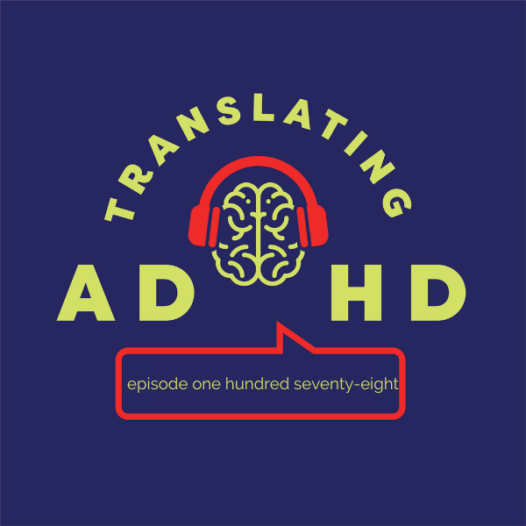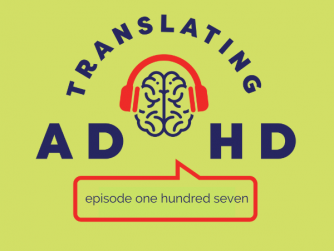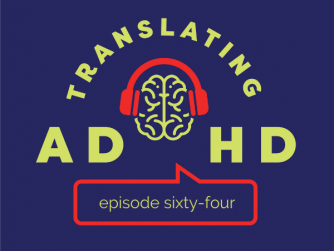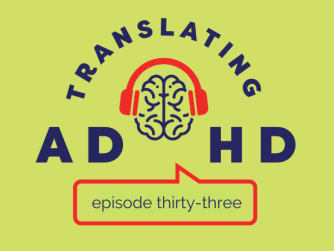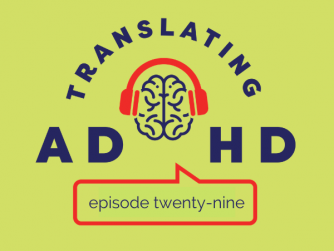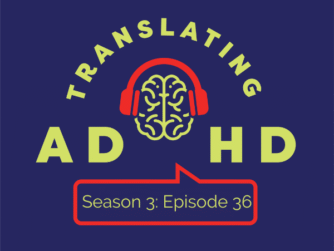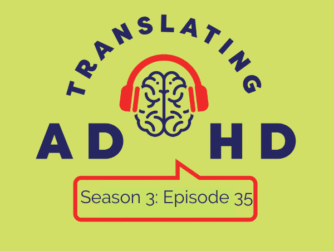After a deep dive into being misunderstood with ADHD, Asher and Cam pivot to managing disruptions with ADHD. They start by looking at the smaller variety of disruptions that are a part of modern living. Ash separates these into internal and external categories. Small external disruptions are the ones like hiccups in our calendars, when things don’t go according to plan. Internal disruptions are those where we start to hyper-focus on a thought or feeling, a misstep or a miscue. Cam introduces the concept of expectation inertia that can come into play with external disruptions. We can really struggle when plans don’t go according to plan, or as Ash explains with a client example, when we are faced with a “different kind of month,” say one with an abundance of birthday celebrations.
Ash continues to share another client example where awareness and self-compassion, along with a practice of anticipating little disruptions, can open the door for real change. Discerning what we can and can not control really matters in managing disruptions. Cam finishes out the episode with a client example where a client kept getting tripped up by the shifting roles through the year. Thinking about these periods as seasons helped to anticipate the impending changes about to occur.
Episode links + resources:
For more of the Translating ADHD podcast:
- Episode Transcripts: visit TranslatingADHD.com and click on the episode
- Follow us on Twitter: @TranslatingADHD
- Visit the Website: TranslatingADHD.com
Episode Transcript:
Ash: Hi, I’m Ash.
Cam: And I’m Cam.
Ash: And this is Translating ADHD. No announcements today. That’s a rare occurrence. So let’s jump right in. Cam, what do you got for us today?
Cam: We’re actually gonna start with a little story that really emanated from last week, and it’s kind of funny. And there was a time when it wouldn’t be funny, but it leads right into this whole new topic that we’re going into around life’s disruptions. Today we’re starting with like little disruptions and how that could just really put us in a bind.
This is, again, one of these things that is ubiquitous to the ADHD experience is how we’re going along and. Whether it’s anticipating that prospective memory, anticipating the future, it’s transitions, but these little bumps that we have in our life can really knock us off course.
So last week I was so excited, Ash. I was so excited to share this thing with you, and I looked at you and I shared it. And I didn’t get the response that I was expecting, and it was the quote that my son gave me, right? What I said was short run through everything except life. And I was so excited because he’s a gamer. You’re a gamer. And I was like, oh, this is gonna be good. Because Ash will like light up and be like, oh yeah, yeah, yeah, yeah. Short run. Short run. Yeah, I get it. Totally. Anyway, the context of that whole thing was around like, you know, getting through to completion points. Delivering on value. We talked about completion.
You and I are fascinated with completion as we work with our clients around the coaching process. And so I share this, old Cam stuff by the way. So by the way, people, I’m looking at Ash right now. We see each other. You don’t see us. But there was nothing, I got nothing from him, absolutely nothing. When I did my little drop of like, okay, I got my gamer lingo. Well, I did an old Cam thing. An old Cam thing is to completely butcher any kind of phrase or saying or you know, a term, an expression. I just get them all wrong all the time.
And so back in the day I would’ve sat with like, ah, I blew that. It went out to like 5,000 people, and I got these words wrong. And so the term is not short run, the term is speedrun. This is when I shared that with Ash today. Speedrun. He’s like, yeah, I know exactly what that is. Speedrun. Yeah, it’s a gaming term, Cam. Okay. Do a do over. And this is another gaming thing, right?
It’s like it’s perfect. Do over the correct phrase is from my son who just sort of shook his head when he heard this. Like that, I just butchered his saying. So Kel, this is for you buddy. Speedrun through everything except life. Okay, now I said it. Now, Ash, how does that land with you? When I say it that way?
Ash: Well, first of all, I know what you’re saying. So that is helpful. So here’s what happened on my end, is I thought short run was some newfangled thing that the kids are doing now in the games that I don’t play because I’m old. But I absolutely know what a speedrun is, right? A speedrun is about efficiency. It’s about getting to the objective of the game as quickly as possible. And so, yeah, hearing that phrase now as it’s intended to be, it lands completely differently. And now you see I am lit up. We could almost do a whole episode just on this.
Before we hit record today, we were talking about different types of disruptions and how they impact our clients, and today we’re gonna look at minor disruptions, which are normal, they are a part of life, but our ADHD makes it hard to anticipate them. Makes it hard to see the impact that a disruption might be having.
Cam: I’m gonna jump in for a sec.
Ash: Yeah.
Cam: And I just wanna say, again, there was a time where I would’ve said something like this, and it would’ve been more than a minor disruption for me because I would’ve hyper-focused on this and thought about it, and it would’ve been a rumination event.
And so, again, it was a minor, minor disruption and the ability to like, okay, let it go. It is what it is, and to laugh. And I think that again, as we start here and we look at disruptions, we’re starting on the end of around inconveniences, hiccups, minor disruptions, and how if we’re not anticipating them, it can really disrupt our day, disrupt our flow, and disrupt our ability to make room for the work, whatever it is.
So I love that we’re transitioning here, but I thought that little story was kind of funny because I could have easily just sort of like, ah, perseverated all week on that. Let it go, Cam. It’s a great little story and we move forward. But I think you’re right. I think there is an episode on the quote that resonates. All right. Give it back to you, Ash.
Ash: I wasn’t gonna do this to you, but since you went back to that, and I’m glad you did, I am gonna tell a little story on you about gaming terms. Do you remember when we first started the Discord and you thought GG meant gotta go?
Cam: Oh, yeah. Yeah, I do. I harass my children. I’ll stand at the door and say, you know, like, GG, GG, like, let’s go, gotta go. And they’re like, ah, you know, embarrassing father moment. It’s a good game. It’s not what you think it is. I fully own that, and that’s embracing my, you know, unique little blemishes and flaws. Ash, that’s what that is.
Ash: So let’s take your example, Cam, of how this might have impacted you previously. That’s a type of disruption that we so often don’t recognize as people with ADHD, when there’s something internal going on that’s affecting our mood, that’s affecting our motivation, that’s affecting any number of things.
I have one that I didn’t realize was impacting until it was over. My kid went away on Sunday to a two week summer camp, no technology for two weeks, overnight summer camp. This is the longest she’s ever been away from home. This is the least amount of contact that we’re going to have with her, and she was really nervous going into this, so I didn’t know how it was going to go. And I am not the type of parent that would force my kid to stay if she was absolutely miserable. But I did put out a significant investment in paying for this camp.
And so on the other side of a successful drop off, which by the way, I did realize I was not the right parent to take her and drop her off. Dad one, as we call him, took on that duty because he doesn’t pick up and feed off of her nervous energy like I do. If we would’ve been in the car together, we would’ve made each other nuts for that two hour drive, whereas he is able to stay calm and be unaffected by that. But it wasn’t until the successful drop off happened that I realized that that’s been there, that’s been there lingering, niggling in the back of my brain and impacting how I’m showing up in other places.
So that’s one way, and the whole point of talking about disruptions is we don’t see the impact as people with ADHD. So now let’s look at a completely different example. We had a participant in Project X who was looking at the month of June and going, this month is insane. In my family, it’s everybody’s birthday, there’s all of these events, and I just don’t know how I’m gonna stay on top of everything. That was the coaching topic she brought is just feeling really, really overwhelmed and feeling like she didn’t have a good handle on her systems. What we actually found was this all or nothing thinking – I have to do all of my systems as designed to keep my place impeccably neat and to keep things running just so, or it all falls apart.
And so the coaching was really about number one, letting go of that limiting belief. Finding some space between that all or nothing. Finding some self-trust that setting some things down for a time could be okay. And then once we got that far, then doing the practical piece of, okay, for this month, what systems, structures, etc., are most important and need to stay, need to happen.
So for example, paying bills doesn’t go on pause for a month just because we’re extra busy. And what things can you put down or ease up on, change standards around for this next month to give yourself some breathing room. Because again, there’s this impact, this effect of less overall time. That’s the reality that we’re dealing with.
And it wasn’t until we really started talking about that impact that my client started to see that it’s not possible this month to do it all unless I wanna drive myself into the ground. I need to find another way to come out on the other side of June not feeling wrecked.
Cam: That’s a great story, and it just illustrates this again, inconveniences, disruptions. This is a change in the calendar, right? Where May is one month and June is a different kind of month, as you said. It’s like, it’s where all the birthdays tend to land. So it’s all these celebrations. It’s all this planning and executing and organizing. As you’re saying that, something else, I’m just gonna throw a term out there that is in my head, expectation inertia.
We have a really hard time adjusting expectations. We make this assumption that as we’re going along, Things will go along as we expect them to, and as things change, as our calendar demands go up or down, and we have these disruptions, whether they’re large or small, but even these small ones, the ones that are kind of under the radar, we have this inertia with our expectation. We’re just assuming that it’s just gonna go along and we can go along and everyone’s gonna go along as is. Right. Business as usual. It’s a fascinating thing. It’s that ability to, on a second. I love what you did there with the client of looking at the end of June. How do you want it to be, right, to look back over June? And what adjustments do we need to make in order for you to?
And back to this idea of addressing needs. When we get stretched and pulled in a million different directions, the first thing that goes is our own personal needs, right? And we sacrifice those to pull off that party, to meet that obligation, to meet that commitment. This whole thing about us, again, we tend to overcommit and then wonder why we’re so overextended.
Ash: I love expectation inertia. That’s a great, great term. So good.
Cam: You heard it here. Trademark.
Ash: If you say it, it must be so.
Cam: Wait a sec. I’m registering it right now. No.
Ash: Okay, so that’s gonna be, what, three hours of dead silence.
Great content. I also appreciate you bringing in needs because this was Project X. And so part of the conversation that this client and I were having is how do I keep taking steps towards Project X? That thing that fills me up, that thing that gives back to me so that I can attend to these other things as part of how I navigate.
So now Cam, I want to talk about a completely different type of example. So we’ve talked about internal, what’s something going on mentally, something niggling in the back of your brain impacting how you’re showing up. And we’ve talked about anticipating a different season, a different month, and adjusting, recognizing that not every season looks the same in terms of available time, energy, bandwidth.
Next I wanna talk about a client who’s had a major shift over time. But here’s where we started, cuz every once in a while he would show up to a coaching session and be like, I’ve just lost it. Like I’ve lost everything, all the stuff we’ve done, nothing’s working. I’m stuck. This is the client who talks about eloquent mode.
So I’m not in eloquent mode. I’m in the opposite of eloquent mode. What is going on? And without fail, when he would show up that way and we’d start checking in, what would we find? Both of our young children were sick this week, and so was the nanny. Woo. That changes everything. My partner was out of town and so I was on extra parenting duties. Something happened at our rental property that required immediate, urgent action. There’s always some hiccup in there that just threw everything off.
Now let me tell you about how this client shows up now. Just last week he showed up, he was like, okay, there’s a couple of things going on that are impacting me. My sleep hasn’t been good, and I know that, and I know it’s impacting me, and this is how it’s impacting me. I had a medication change because of a medication shortage, and the generic that they put me on impacted me in a way that wasn’t working for me. And so now I’m trying something different with my psychiatrist, and I’m anticipating that yet another medication change is going to continue to have an impact, and I’m paying attention to that. So you see, this happened with my kids this week, and this is how it impacted me.
So there’s this awareness that wasn’t there before. And alongside that awareness, there’s this pivoting. So it’s no longer all or nothing. I’m doing awesome or I’m doing poorly. He’s finding space between. And because he’s recognizing these external factors that are impacting, he’s also practicing self-forgiveness, not going into guilt and shame. Because he’s got a more realistic picture about what’s possible and what’s not possible. This week was shot because too many disruptions happened, so I accomplished what I was able to accomplish, but it wasn’t the type of week where I could push major Project X, Q2 type stuff forward. And that’s okay. I see how it wasn’t that week. Which is very different than in those early days when he would show up just frustrated, why can’t I be more consistent? Why can’t I get to these things more often?
Cam: I really appreciate the distinction between the internal and the external. And also the movement or growth of this client to move from this frustration – Why can’t I do what I know I ought to do? To really taking an objective approach to this. Recognizing, separating himself from the dilemma and the challenges and distinguishing awareness from the pivoting.
It reminds me of an old metaphor of mine that I used with clients for a long time, and it’s worth bringing it up here as so often we focus on trying to stay in the saddle, but if we have useful step stools around that horse, it’s easier to get back in the saddle. That anticipating we’re gonna fall off the horse, this is one of those things, again, like why we are not successful with like, exercise, practices or routines or regimens. That thing that is repetitive, developing habits, is that often we’ll start and we don’t get to that place where we fall off. We hit a bump in the road. We’re knocked off the horse, and it’s the ability to recognize that and have ways to get back into that practice, to find that step stool, that reliable step stool.
And this is about resilience and resourcefulness and this, again, attending to this work over a period of time. It’s not linear, it’s not consistent. There are days and windows where we can make progress. And there are days where we really just have to kind of hold on and get through that day.
Ash: Exactly, Cam. It’s really about distinguishing what’s in your control and what’s, at this moment, not so in your control. So for that last client I was just talking about, the impact of medication is not within his control, but scheduling time with the psychiatrist and making sure that he’s attending to that so that he can find the right replacement medication for him is in his control, and in fact was one of the actions from that coaching session.
Even something like sleep. In that session we did talk about some practices around sleep, which everything else being equal are great practices that have worked for this client before, but he’s got two very young children, so sometimes he is not able to have agency when it comes to sleep, and anyone that has young kids can appreciate that. There’s elements within your control, but there are times where you’re just gonna be running on low sleep, and you have to figure out how to adjust to that in a way that works for you.
Cam: I really appreciate the other piece that you shared is this awareness – the ability, the mechanism, to pivot and adjust. But also that self-compassion, the ability to forgive oneself. And I said this a couple weeks ago, we said this a couple weeks ago, that awareness always precedes change. Awareness always precedes the pivot. The ability to adjust, the ability to change and shift. To a new scenario, a new season, a new month.
And so as you develop that keen observer, and that awareness is to bring that self-compassion in there, as you develop the ability to pivot and adjust and take a different course, I want to take us out today with one more client example.
And it was, Ash, as you were saying, I’ve had several clients who really came to the realization of seasons. You mentioned this, the season, so hearkening back to your client around June is a different kind of month for this client who’s in the class, Project X. And to adjust expectations given how their June is different than anyone else’s June.
And listeners, I think this is a really great place to give some attention, is to consider, oh, here we are at the beginning of the summer. are you entering a new season? I have a client who, she’s a professional. She owns her own business, and during the school year, she’s got more hours she can give to her business. She’s the business owner. She is the chief designer slash architect. She wears so many different hats. Every summer she hits this bump. It’s sort of like, again, school’s out, kids are here, and she’s developing a program for them. And at first it’s sort of like this, ah, irritation not with the kids so much, but just like, why am I struggling to get done what I need to get done? It’s not allowing for this shift in season.
And oh, by the way, it’s something that she intended to do all the time. She has her own business so she can have the flexibility to spend time with her kids in the summertime. But as she’s going along and we get into these modes, we’re into a mode, and we’re just going along, plugging along, and we’re not anticipating the shift is coming up where there’s a new role, mom, coming on board much more. So she’s gotta be able to dial back PR and marketing and meeting with new clients, it’s like, let’s dial it back. We can pick it back up in the fall.
So to think about clients, or excuse me, listeners, to think about what are your bigger seasons where there are adjustments and if you don’t anticipate, it tends to be this disruption? It’s disrupting. There’s a hiccup, and there’s a little bit of a rough patch there to adjust to. What can you do to anticipate that transition and look at that in a more proactive manner?
Ash: I’m so glad you came back to that because I do love this notion of seasons. I have a client who is a special educator and seasons also work really well for her. ACT season is a season. Parent-teacher conference season is a season. Summer is a season, and not in the freewheeling way one typically might think of when it comes to educators because summer is really her time to attend to all of the little things that she can’t attend to during the school year.
I will say I also understand my own seasons really well, and that’s a line of thinking I’ve had for a long time. Summer is play season. My work, I go on tour. I don’t take on major new initiatives. I don’t take on big projects. Summer is for play.
And then from about Thanksgiving through January 15th, I have very low expectations of myself, not just because of the busy holiday season, but because of all of the end of year tasks, taxes, finances. All of those things that come along with that season, plus the natural slowdown in my coaching practice, people have holiday travel plans, my calendar gets a little more sparse and that’s okay. It’s okay to let it be a little slow and a little quiet those two months of the year because that sets me up really well for mid-January through summer. That’s the time that I’m doing deep work, and I’m taking on projects, and I’m attending to those bigger things that I wanna move forward.
Cam: I think that’s a great place to finish up today, Ash.
Ash: I agree. So listeners, if you like what we’re doing here on the show, one big way you can help us out is to leave a review wherever you listen. Been a while since the last one. So if one of you could help us out there, that would be amazing. So until next week, I’m Ash.
Cam: And I’m Cam.
Ash: And this was the Translating ADHD podcast. Thanks for listening.

